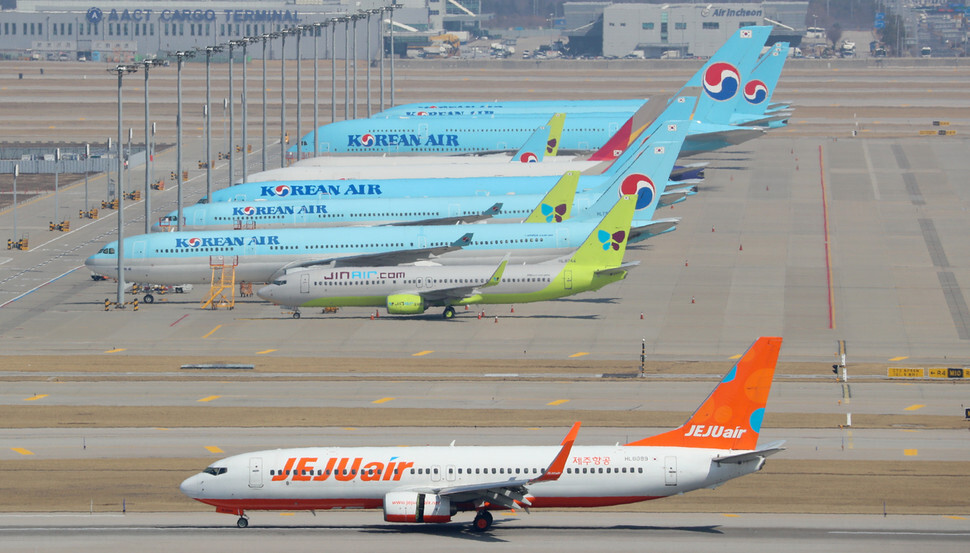hankyoreh
Links to other country sites 다른 나라 사이트 링크
91 countries now banning or restricting entry for travelers arriving from S. Korea

So far, the number of countries and territories that are banning or restricting entry by visitors from South Korea in an attempt to prevent the influx of the novel coronavirus has increased to 91.
According to figures released by South Korea’s Ministry of Foreign Affairs (MOFA) at 8 pm on Mar. 3, 37 countries are banning entry from Korea either completely or for a certain period of time. The latest addition since the previous evening is the Pacific island country of Nauru, which is banning entry to foreigners who have been to South Korea, China, Hong Kong, Macao or Italy within the past 21 days.
A total of 24 countries, including China, are quarantining people arriving from South Korea. There are also 30 countries that have toughened quarantine measures for Koreans by screening or monitoring them for fever, recommending self-quarantine or suspending the issuance of visas on arrival. Seven countries have been added to this list over the past day: Myanmar, Brunei, Nepal, Venezuela, Rumania, Liberia, and the Democratic Republic of the Congo.
Myanmar is quarantining foreign nationals who have visited Daegu during the 14 days prior to entry or whose body temperature is above 38 degrees in fever screening. Brunei is recommending self-quarantine for foreigners who enter the country after visiting South Korea. As of Mar. 10, Nepal will stop issuing visas on arrival for foreigners who have been to South Korea, China, Japan, Iran, or Italy.
Some countries have toughened measures already in place. India had already suspended visas on arrival, and on Mar. 3 it announced that all ordinary and e-visas issued to South Koreans, Italians, Iranians, and Japanese would no longer be valid as of Mar. 4. Invalidating the visas of people who haven’t yet entered India can be seen as a de facto entry ban.
During a phone call on Tuesday evening, South Korean Foreign Minister Kang Kyung-wha asked Indian Minister of External Affairs Subrahmanyam Jaishankar to refrain from imposing further entry restrictions. Kang elaborated on the various measures and efforts that the South Korean government is taking to block the spread of COVID-19, the disease caused by the coronavirus, and expressed her hope that India would quickly resume issuing visas on arrival and e-visas prior to arrival. Jaishankar responded by saying that India had no intention of inconveniencing Koreans hoping to visit India. Jaishankar said that ordinary visas can still be obtained, just as before, at the Indian Embassy in South Korea and that India would cooperate fully in issuing visas when the purpose of the visit was certain, such as with business trips.
Singapore has expanded its entry ban, which had been limited to travelers who’ve been to Daegu and Cheongdo County, to encompass all travelers who’ve recently been to South Korea. Russia is having foreigners who fly into Moscow from South Korea to spend 14 days in self-quarantine, a measure that had previously applied to arrivals on the island of Sakhalin.
While the US has not yet imposed entry restrictions on South Korea, passengers are checked for fever at airport boarding gates and can be turned away if their temperature is above 37.5 degrees.
Detailed information about the measures that various countries are imposing on people traveling from South Korea is available at the safe travel abroad website maintained by the Ministry of Foreign Affairs (www.0404.go.kr/dev/newest_list.mofa).
By Park Min-hee, staff reporter
Please direct comments or questions to [english@hani.co.kr]

Editorial・opinion
![[Column] Has Korea, too, crossed the Rubicon on China? [Column] Has Korea, too, crossed the Rubicon on China?](https://flexible.img.hani.co.kr/flexible/normal/500/300/imgdb/original/2024/0419/9317135153409185.jpg) [Column] Has Korea, too, crossed the Rubicon on China?
[Column] Has Korea, too, crossed the Rubicon on China?![[Correspondent’s column] In Japan’s alliance with US, echoes of its past alliances with UK [Correspondent’s column] In Japan’s alliance with US, echoes of its past alliances with UK](https://flexible.img.hani.co.kr/flexible/normal/500/300/imgdb/original/2024/0419/2317135166563519.jpg) [Correspondent’s column] In Japan’s alliance with US, echoes of its past alliances with UK
[Correspondent’s column] In Japan’s alliance with US, echoes of its past alliances with UK- [Editorial] Does Yoon think the Korean public is wrong?
- [Editorial] As it bolsters its alliance with US, Japan must be accountable for past
- [Guest essay] Amending the Constitution is Yoon’s key to leaving office in public’s good graces
- [Editorial] 10 years on, lessons of Sewol tragedy must never be forgotten
- [Column] A death blow to Korea’s prosecutor politics
- [Correspondent’s column] The US and the end of Japanese pacifism
- [Guest essay] How Korea turned its trainee doctors into monsters
- [Guest essay] As someone who helped forge Seoul-Moscow ties, their status today troubles me
Most viewed articles
- 1[Column] The clock is ticking for Korea’s first lady
- 2Hong Se-hwa, voice for tolerance whose memoir of exile touched a chord, dies at 76
- 3After 2 months of delayed, denied medical care, Koreans worry worst may be yet to come
- 4[Column] Has Korea, too, crossed the Rubicon on China?
- 5Samsung barricades office as unionized workers strike for better conditions
- 6US overtakes China as Korea’s top export market, prompting trade sanction jitters
- 7All eyes on Xiaomi after it pulls off EV that Apple couldn’t
- 8[Guest essay] How Korea turned its trainee doctors into monsters
- 9[Editorial] As it bolsters its alliance with US, Japan must be accountable for past
- 10[Correspondent’s column] In Japan’s alliance with US, echoes of its past alliances with UK